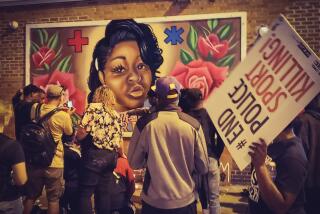A Woman Sacrificed for Honor of Her Family
- Share via
LAHORE, Pakistan — She was 28, the mother of two young children. And she was desperate for a divorce from the husband who beat her.
Samia Imran’s mother promised her daughter she would help. Instead she hired an assassin.
It was a question of honor.
The attack was brazen--daylight in a packed lawyer’s office in the heart of one of Pakistan’s busiest capitals. It shattered stereotypes about the victims of honor crimes because her family was wealthy and well educated. And despite the fact that there were witnesses, no one has been arrested.
Samia Sarwar, slightly built with long, dark hair, had married a cousin when she was 17 in a match arranged by her family. For several years she lived with the man who abused her, a doctor named Imran.
Samia ran away from her husband after he threw her down a flight of stairs while she was pregnant with her second child. She returned to her parents’ home in Pakistan’s deeply conservative Northwest Frontier Province.
After her son was born, Samia enrolled at Peshawar University to study law. Classmates remember her as shy, saying she kept to herself and her studies. And all the while, she pleaded with her parents to help her get a divorce.
Although her parents accepted that her husband was abusive and her father said they did not pressure Samia to return to him, they refused to entertain the idea of a divorce.
Samia had been living apart from her husband for four years when her parents left to perform the Hajj pilgrimage to Islam’s holiest sites in Saudi Arabia. Samia seized the opportunity and ran away to a women’s shelter in Lahore.
“A lovely girl, soft-spoken, so polite,” said the shelter’s supervisor, who would give only her husband’s name, Akhtar Malik.
Samia’s parents returned from the Hajj on April 2, 1999. Afraid her father would try to kill her for seeking a divorce, Samia turned to her mother for help. Her mother agreed to meet with Samia at her lawyer’s office April 6.
“I’ll be back soon . . . with my freedom,” she told Mrs. Malik as she walked out that morning.
“She left here with a smiling face,” Mrs. Malik said. “She didn’t know they would murder her.”
Instead of the help she had promised, Samia’s mother brought a gunman to the meeting. As Samia stood and turned to greet her mother, he fired two quick shots into her head and chest.
Samia reeled from the force of the bullets, slumping to the floor.
“Her mother didn’t even look at her. She just walked out the door,” said Samia’s attorney, Hina Jilani, who was in the office.
More than a year later, no one has been charged--despite the testimony from witnesses and the fact that paralegal Shahtaj Qizalbash, who was briefly taken hostage afterward, heard Samia’s uncle bragging about arranging the killing and listened as her father asked, “Has it been done?”
A police complaint has been filed against Samia’s mother, but no formal charges have been brought. Police say they are still investigating.
Samia’s death spurred women’s groups and human rights organizations into action in Pakistan and abroad because she was educated and the daughter of wealthy parents, who also were educated. Her death contradicted the stereotype that honor killings occurred only in rural society.
But Samia’s father, Hajji Ghulam Sarwar, a prominent businessman, has received the support of religious and community leaders.
“If women need help they should get help from their family members, uncles, brothers,” Sarwar said. “This is the best way--they should not go out of the family. . . . It is very embarrassing for the family.”
Since Samia’s death, Pakistan’s religious right has targeted her lawyers--Jilani and her sister, Asma Jehangir, also a human rights lawyer and activist. The two operate the shelter where Samia had been staying.
Conservative groups accuse the two of corrupting women, flouting religious and cultural traditions and seeking to impose Western values on women. Religious leaders have issued fatwas, or religious edicts, calling for their deaths.
They have asked Pakistan’s government to shut down the women’s shelter, the only privately run one in the nation. Government-run shelters are not considered secure because a husband, father or brother has the legal right to remove a girl from the shelter.
Samia’s brother and sister knew of their parents’ plan to kill her, said a family friend, a woman who was afraid to be identified. Her sister did not warn her, and her brother agreed that Samia had brought dishonor to the family, the friend said.
It was Samia’s worst fear, according to a friend of hers from the shelter who also would not allow her name to be used.
“Samia used to say, ‘They will kill me. . . . They want to keep the honor of the tribe. That is more important than my life.’ ”
More to Read
Sign up for Essential California
The most important California stories and recommendations in your inbox every morning.
You may occasionally receive promotional content from the Los Angeles Times.













